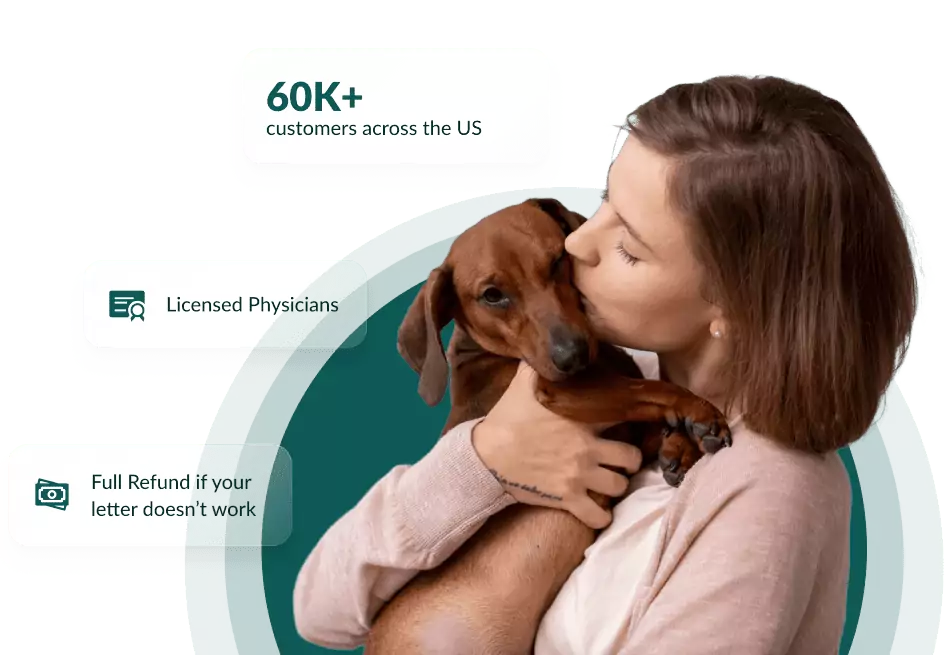Get Your Texas
ESA Letter Today
Interest-free payment plans are now available. Choose financing at checkout to pay in easy installments starting at $32.25.






Experience Our Quick and Easy Process
Your ESA Letter Contains the Following:

Your ESA Letter Contains the Following:
1
ESA ID and verification
Your pet’s emotional support Animal ID and a like verification
2
Healthcare providers details
Medical provider’s name, signature, national provider identifier (NPI) and license number.
3
Personal information
Your name, date of birth (DOB) and your medical diagnosis.
See what our happy pet parents have to say…
What do I need to know about ESA in Texas?

Fair Housing Act (FHA)
The Fair Housing Act protects your right to live with your Emotional Support Animal (ESA) in housing that typically doesn’t allow pets. With an ESA letter, landlords must make reasonable accommodations for your animal, and they cannot charge you extra pet fees or deposits.

Air Carrier Access Act (ACAA)
The Air Carrier Access Act allows some flexibility for ESAs when flying. Although recent changes have limited ESA access on flights, some airlines may still accommodate ESAs. Always check with the airline in advance to understand their specific policies.

Americans with Disabilities Act (ADA)
While the ADA primarily covers service animals, it’s important to know that ESAs do not have the same public access rights. However, they do have specific protections in housing and, in some cases, air travel. Knowing the differences can help you navigate situations more effectively.

Emotional Support
An ESA offers companionship that can help reduce anxiety, depression, and feelings of loneliness. Their presence can create a calming environment and provide comfort during difficult times.

Stress Relief
Having an ESA can lower stress levels by offering unconditional love and support. Their companionship can lead to a more relaxed and stable emotional state, helping you manage daily stressors more effectively.

Social Interaction
ESAs can encourage more social interaction. Whether it’s through meeting new people during walks or simply having a conversation starter, an ESA can help you feel more connected to others, which is beneficial for mental health.

Eligibility Requirements
To qualify for an ESA, you must have a mental or emotional condition that benefits from the companionship of an animal. Common conditions include anxiety, depression, PTSD, and other mental health challenges. A licensed mental health professional can determine if an ESA is right for you.

Getting an ESA Letter
You need an official ESA letter from a licensed mental health professional to legally recognize your pet as an ESA. The letter must state your need for the ESA and be on official letterhead with the provider’s signature and license number.

Consultation with a Professional
To obtain an ESA letter, you’ll need to consult with a licensed therapist, psychologist, or psychiatrist. They will evaluate your condition and determine if an ESA can provide therapeutic benefits. This consultation can often be done online, making the process convenient and accessible.
Learn About Wellness Wag

Find Peace and Comfort
Our dedicated team improves lives through the healing power of emotional support animals. With years of experience, we’ve helped many individuals find peace and comfort with an Emotional Support Animal.
We provide easy access to Emotional Support Animal Letter consultations for those facing emotional or mental health challenges. Our mission is to offer the support and resources you need with confidence and empathy.
Meet some of our
compassionate care team

Dr. J. Chance Miller

Dr. J. Chance Miller is originally from Alabama, where he graduated from the University of Alabama at Birmingham with a B.A. in Spanish and minors in Biology and Chemistry.

Dr. Stephanie White

I’m Dr. Stephanie White, a Licensed Clinical Social Worker with advanced training in counseling since 2002. Offering Teletherapy, I guide you through challenges with evidence-based care.

Robert Staaf

LCSW Therapist with extensive experience in social work and therapy. Currently providing remote telehealth services at UpLift and Headway.

Dr. Allison Shew

Licensed Mental Health Professional with over 20 years in clinical counseling and program management. Currently at Lifestance Health.

Dr. Lytara Garcia

A compassionate Licensed Clinical Social Worker with a Master’s in Social Work from USC, this professional specializes in therapeutic support for adults and older adults dealing with depression, anxiety, and substance abuse.

Tia B. Risco, M.S.

A therapist and professor at California State University Northridge, this professional holds a Master’s in Marriage and Family Therapy and is pursuing a Doctorate in Clinical Psychology.
FAQs
No, there is no official registration or certification requirement for emotional support animals (ESAs). Unlike service dogs, which undergo specialized training to perform tasks for individuals with disabilities, ESAs primarily provide emotional support and companionship to their owners.
Having an emotional support animal (ESA) can provide several benefits for individuals facing emotional or mental health challenges.
- Provides companionship and emotional comfort, reducing anxiety, depression, and loneliness.
- Helps lower stress levels and creates a calming environment.
- It allows you to live with your ESA in a housing that typically doesn’t allow pets.
- Helps you avoid extra pet fees or deposits.
- Supports daily life by establishing routines, improving mood, and increasing social interaction.
- Offers unconditional companionship, making you feel more connected and secure.
Wellness Wag’s ESA letters are legitimate due to the following factors:
- The team consists of licensed medical providers who are fully qualified and have passed board exams. Wellness Wag carefully selects a licensed medical provider who is legally qualified to approve ESA Letters specific to your state.
- Our professionals establish a relationship with you through a phone consultation, ensuring a valid basis for prescribing you an ESA letter.
- The ESA Letter is issued directly from a licensed licensed medical provider, containing their license number and contact information. The letter is written on professional letterhead and includes everything legally required.
Emotional support animals (ESAs) do not have the same public access rights as service dogs. While service dogs are trained to perform specific tasks for individuals with disabilities and are allowed access to most public places, ESAs do not have the same level of access. Generally, ESAs are not granted automatic access to public spaces such as restaurants, stores, or other establishments that have a “no pets” policy. However, there are exceptions to this rule. Under the Fair Housing Act, ESAs are allowed in housing accommodations that have a “no pets” policy, and they may also be permitted to accompany their owners on certain flights under the Air Carrier Access Act.
An ESA letter, also known as an Emotional Support Animal letter, enables individuals to obtain certain benefits and accommodations for their emotional support animals. Unlike service dogs that undergo specific training to perform tasks for individuals with disabilities, emotional support animals provide comfort and support through their presence. With an ESA letter, individuals may be able to live in housing that otherwise has a “no pets” policy, as it grants them protection under the Fair Housing Act. Additionally, an ESA letter may allow individuals to travel with their emotional support animal in the cabin of an aircraft under the Air Carrier Access Act. However, it’s important to note that an ESA letter does not grant automatic access to public places where pets are not allowed, as service dogs are the only type of animals with broad public access rights.
Yes, the Fair Housing Act (FHA) does apply to emotional support animals (ESAs). The FHA is a federal law that prohibits housing discrimination based on disability. It requires housing providers to make reasonable accommodations for individuals with disabilities, including those who have emotional support animals. This means that individuals with a valid ESA letter may be allowed to keep their emotional support animal in housing that has pet restrictions or “no pets” policies. However, it’s important to follow the specific guidelines and requirements outlined by the housing provider, such as providing documentation of the need for an ESA. While the FHA protects the rights of individuals with ESAs in housing situations, it’s essential to note that the FHA does not extend the same broad public access rights to emotional support animals as it does to service dogs.
The rules regarding traveling on airlines with emotional support animals (ESAs) have recently changed. As of 2021, the U.S. Department of Transportation (DOT) has revised the Air Carrier Access Act (ACAA) regulations. Under the new rules, emotional support animals are no longer considered service animals for air travel. However, passengers with disabilities are still allowed to travel with service dogs. If you have an emotional support animal, it will be subject to the airline’s pet policy. Many airlines now require that ESAs be treated as pets and transported in the cabin for a fee, following the airline’s specific guidelines and requirements. It’s crucial to contact your airline in advance to understand their policies regarding emotional support animals and to ensure compliance with any documentation or vaccination requirements they may have. Please note that these regulations may vary between airlines, so it’s important to stay informed and plan accordingly before traveling with your emotional support animal.
If you believe you qualify for an emotional support animal (ESA), there are a few steps you can take to acquire one. First, it’s essential to consult with a qualified mental health professional who can assess your emotional or mental health condition and determine if an ESA would be beneficial for you. This professional can be a licensed therapist, psychologist, or psychiatrist. If they determine that an ESA would be suitable for your situation, they can provide you with an ESA letter. An ESA letter is a formal document that verifies your need for an emotional support animal and grants certain privileges and protections under the law.
Once you have obtained your ESA letter, the next step is to find a suitable animal. Unlike service dogs, there are no specific breed or training requirements for emotional support animals. You can choose a dog, cat, or even another type of domesticated animal that provides you with comfort and support. It’s important to consider factors such as your living situation, lifestyle, and any allergies or restrictions you may have.
It’s worth noting that there is no official registry or certification for emotional support animals. While some websites may claim to offer emotional support animal registration or certification, these are often unnecessary and not recognized by law. The validity of an ESA letter from a licensed mental health professional is what matters in terms of establishing your need for an emotional support animal.
Lastly, it’s important to familiarize yourself with the laws and regulations related to emotional support animals in your specific area. The Fair Housing Act (FHA) provides protections for individuals with ESAs in housing situations, allowing them to live with their animals even in housing that has pet restrictions. However, the rules regarding ESAs in public places, such as restaurants or stores, may vary. It’s advisable to check local regulations and establishments’ policies to ensure you and your emotional support animal are in compliance.
Remember, acquiring an emotional support animal should always be done in consultation with a qualified mental health professional, who can guide you through the process and ensure that it is suitable for your specific needs and circumstances.
The need to renew your ESA letter depends on various factors. Unlike service dogs, emotional support animals do not require specific training or certification. An ESA letter, issued by a licensed mental health professional, serves as documentation of your need for an emotional support animal. While there is no legal requirement to renew your ESA letter, it’s important to consider the expiration date mentioned in the letter.
Many mental health professionals recommend reviewing and updating your ESA letter annually or as needed. Some airlines and housing providers may have specific requirements regarding the validity of the letter, typically within the past year. Additionally, your personal circumstances or treatment plan may change over time, and it’s beneficial to ensure that your ESA letter reflects your current needs.
Renewing your ESA letter involves consulting with your mental health professional again to evaluate your ongoing need for an emotional support animal. They will assess your condition and determine if the presence of an ESA continues to provide therapeutic benefits. If they determine that it is still appropriate, they can issue a renewed ESA letter with an updated expiration date.
Remember to check the specific requirements of airlines, housing providers, and other establishments you may encounter, as some may have additional guidelines or documentation requirements. It’s important to comply with any regulations to ensure a smooth experience when traveling or securing housing accommodations with your emotional support animal.
Ultimately, the decision to renew your ESA letter is best made in consultation with your mental health professional, who can provide guidance based on your unique circumstances and needs.
No, you cannot register multiple pets with the same ESA letter. Each emotional support animal requires its own individual ESA letter. The ESA letter is specific to the individual and their unique needs. It is not a blanket certification that covers multiple animals. The letter is issued by a licensed mental health professional after assessing your condition and determining the therapeutic benefits of an emotional support animal for you. Therefore, if you have multiple pets that serve as emotional support animals, you will need a separate ESA letter for each one of them. Each letter will outline the specific animal and the support it provides to you. It’s important to adhere to this requirement to ensure that your rights and accommodations are properly recognized and upheld.
Yes, an existing pet can qualify as an emotional support animal (ESA). Unlike service dogs, which undergo specific training to perform tasks for individuals with disabilities, emotional support animals provide comfort, companionship, and emotional support to individuals with mental health conditions. While there is no specific requirement for the breed or species of an ESA, it is important to note that not all pets automatically qualify. To obtain an ESA designation, you need an ESA letter from a licensed mental health professional. This letter verifies your need for an emotional support animal based on your specific mental health condition. It’s essential to consult with a qualified professional to determine if your existing pet meets the criteria for an ESA and to obtain the necessary documentation.


Are you ready to start the process?
Say goodbye to pet fees and always have your beloved companion by your side, no matter where you live.





